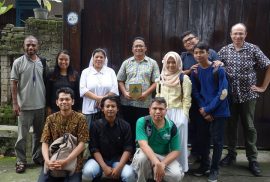Anang G. Alfian | CRCS | Article

“Jesus as an infant fled with his family into exile. During his public life, he went about doing good and healing the sick, with nowhere to lay his head”.
We were finally in the next to last meeting of Religion and Globalization class. Having studied religion and globalization through the whole sessions, we have come to understand a lot about what role of religions play in accord to globalization and how globalization affects the way religions are concerned with humanitarian issues.
On Monday, November 21, 2016, we had a field trip to one faith-based-NGO to understand how such religious organization works for humanity. Jesuit Refugee Service (JRS) is one of the well-known international organizations and it was a good place to learn the working field of faith-based organizations. Together with Gregory Vanderbilt as the lecturer of the class, we visited the national office of JRS in Yogyakarta and had a great time meeting Fr. Maswan, S.J., and learning directly from a member of the community
 Our visit began with Fr. Maswan’s presentation about the organization. Firstly established in Indonesia in 1999, Jesuit Refugees Services has been accompanying, advocating, and giving services to forcibly displaced people. Therefore, this organization has actually been well experienced in dealing with the issues. As we listen to his presentation, we come to realize that this problem of refugees and asylum seekers cannot be ignored for it belongs to international concern. The perpetuation of war, disasters, racial conflict, and many other causes make refugees seek for their safety life by migrating to other national boundaries.
Our visit began with Fr. Maswan’s presentation about the organization. Firstly established in Indonesia in 1999, Jesuit Refugees Services has been accompanying, advocating, and giving services to forcibly displaced people. Therefore, this organization has actually been well experienced in dealing with the issues. As we listen to his presentation, we come to realize that this problem of refugees and asylum seekers cannot be ignored for it belongs to international concern. The perpetuation of war, disasters, racial conflict, and many other causes make refugees seek for their safety life by migrating to other national boundaries.
However, it has never been easy for refugees because they have to face the legal and often difficult administrative regulations of the government where they are staying. This is exactly what happens to refugees in Indonesia. Because Indonesia has not ratified the 1951 Convention Relating to the Status of Refugees, refugees in Indonesia are not recognized as such by the Indonesian government—instead they are considered undocumented aliens—while they wait for recognition from the UNHCR which will allow them to resettle in another country. In some districts, refugees have to stay in detention center while waiting for their legal refugee status to be acknowledged by the law.
As recorded in JRS monitoring, refugees in Indonesia have reached a number of 4.344 people of whom 540 are female and 905 are children with 96 being unaccompanied minors and seperated children. So far, JRS has been accompanying two detention centers in Surabaya and Manado and being involved in other areas as well. In Aceh, JRS has advocated for protection over 625 people and has given psychosocial accompaniement to over 1558 refugees. In Yogyakarta, they are serving the refugees, mostly from Afghanistan, housed in the Ashrama Haji. They listen, accompany, and make activities to give hope for those people who had been separated from their family and their mother land.
So, where is exactly the religion to deal with this? This question come out of students trying to figure out the role of religion in this humanity organization. Then, the community member continued the presentation stating that the mission of JRS is intimately connected with the mission of Society of Jesus to serve faith and promote the justice of God’s kingdom in dialogues with cultures and religions. Yet, another student comes up with another concern, “Does it mean that JSR proselytize Christianity?” Well. This is very important because in the previous meeting, we read through Philip Fountain’s “Proselytizing Development” and he himself attended our class for discussing this topic. In sort, the religion has been inspired by the development organization as precedent in history while, vice versa, religion brings universal ethics to be put in dialogue with cultures and religion.
 In the last session of our discussion in JRS offices, Fr. Maswan emphasized some points such as it is the problem of humanity that we have to be concerned about and not at all concerned in religious kind of missionary work altough it might inspired the organization in its underlying ethics, building cooperation with other cultural, faith-based, and other types of organization. We also read the paper Fredy Torang (2013 batch) presented in Singapore about how JRS acts as an agent of “humanitarian diplomacy” between the refugees and the local communities and government. In 2017, JRS will continue lobbying local government to allow refugees to live in a community and not in detention and also monitoring the migration all over the world to help assisting the displaced people and consistently gives concern to human right and dignity.
In the last session of our discussion in JRS offices, Fr. Maswan emphasized some points such as it is the problem of humanity that we have to be concerned about and not at all concerned in religious kind of missionary work altough it might inspired the organization in its underlying ethics, building cooperation with other cultural, faith-based, and other types of organization. We also read the paper Fredy Torang (2013 batch) presented in Singapore about how JRS acts as an agent of “humanitarian diplomacy” between the refugees and the local communities and government. In 2017, JRS will continue lobbying local government to allow refugees to live in a community and not in detention and also monitoring the migration all over the world to help assisting the displaced people and consistently gives concern to human right and dignity.
Arsip:



